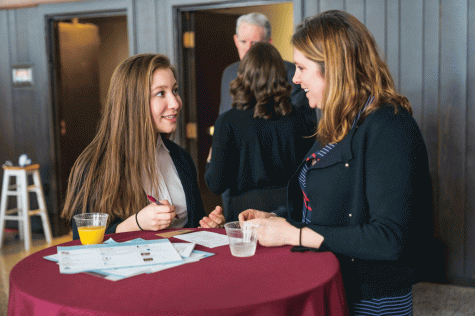Colgate Must Lead the Way in Addressing Sexual Assault
When we sit and talk with our students, we learn all sorts of things about life at Colgate. Most are exciting and encouraging things about learning inside and outside the classroom. But some are tragic stories about sexual harassment and assault. Most of these stories come from women, but not all of them. A good number come from first-year students. These stories break our hearts.
All colleges and universities face this growing problem, but that is no excuse. We are determined to help Colgate lead the way in addressing and reversing this sad and shocking trend.
Much is being done, but there is much more to do.
In the 2009 Campus Climate Survey of students, this fact was brought home to us and made us more determined to be outspoken about the challenges we face. In this survey, completed by half of the student body, more than 70 percent of Colgate students said they had been victimized by some form of sexual harassment. 45 percent of all female students and 19 percent of all male students said they had been victims of sexual abuse or attempted sexual assault. And 16 percent of women and seven percent of men reported having been sexually assaulted since coming to Colgate. This is absolutely unacceptable.
First and foremost, we want to strongly state that Colgate does not condone and will adjudicate sexual harassment and assault cases in a way that is fair to and open to both sides.
Zero tolerance. The new Colgate Sexual Misconduct Policy instituted in 2009 has been tested several times in our disciplinary board hearings, made up of trained students, faculty and staff. See the policy and resources at colgate.edu/sex under, “If Things Go Wrong.”
Reporting opportunities. We have many avenues that students can take to report sexual assault, even anonymously. Please go to colgate.edu/sex under “If Things Go Wrong” to review and take note of these options.
While response is critical, we work equally hard to prevent such tragic circumstances. We want students to feel and be safe at Colgate. Since the 2009 survey, we are doing much more to make that happen. The survey sparked new initiatives and opened the doors to in-depth discussions among students, faculty, staff and administrators. What we have found is that students want to talk about their relationships and the options open to them – including choices to abstain from sexual relations, to commit to monogamous relationships and to avoid the “hook-up” culture.
Colgate has instituted a range of programs that allow our students to address these issues and make healthier choices of their own. Here are of few examples of the options available:
1. Positive sexuality programming and information. Beginning in 2009, all students have had to attend educational presentations on our new sexual misconduct and harassment policy during the first week of classes. We offer other well-attended sex education presentations like Sex 101 and the popular non-credit course “Yes Means Yes,” which is a safe space for discussion about sexuality, power and consent. For more information about the “Yes means Yes” program, contact dlafrance@ colgate.edu.
2. Positive Sexuality House. A new co-ed group of upperclassmen live together in Bunche House and explore sex-positive initiatives that promote healthy relationships. This group of students is interested in reinforcing healthy relationships and safe-sex practices. Some of their planned events include the “Morning After Brunch,” Sex Debate, Sex Across Borders, Sexy Art, Media and Sex, Sex and Religion and LGBTQ relationship discussions. Stay tuned for more details.
3. On-Campus Resources. Colgate provides students with many resources for support, reporting and healing from sexual assault. Our counseling center, chaplains’ office and health center provide understanding and confidential services. Sexual harassment advisers, comprised of faculty, staff and students, are another source of help and referral. Please go to colgate.edu/sex under “If Things Go Wrong” to review and take note of these options. In addition, the Women’s Studies Center in East Hall offers safe sex information, resources and regular programming on gender and sexualities.
4. Student advisors and training. Our trained RA staff, Link staff and harassment advisers are excellent sources of information and assistance. These peer-to-peer mentors allow older students to share their accrued wisdom on all aspects of campus life, including relationships and empowerment. “The Network” offers student-to-student peer support (Visit COVE for more information). In addition, psychological counselors offer personal guidance and intervention. Visit the Counseling Center at www.colgate.edu/ offices/support/counseling.
5. Mentors in Violence Prevention (MVP) at Colgate. Started at Northeastern University’s Center for the Study of Sport in Society in 1993, MVP provides bystander training to empower students to intervene in real-life scenarios where there is the threat of assault and violence. Colgate instituted a chapter this fall. For more information check out colgate.edu/ studentlife/lifeatcolgate/residentialeducationprogram/mvp.html or contact Dean Brown at [email protected].
6. Academic courses. Colgate offers over twenty courses with critical sexualities components. For more information, look at course offerings in interdisciplinary programs including but not limited to LGBTQ Studies and Women’s Studies.
We are committed to the health of the Colgate student community. We know that your experiences outside the classroom have a significant impact on your academic performance and the quality of your life.
We are making progress, but sexual harassment and assault among students still exists at Colgate. We must come together to prevent it. Learn how to respond appropriately when you are in a bad situation. Know the resources. Help a friend. Be a responsible bystander. Take advantage of the options already underway. Suggest new ones. We are determined not only to help you, but to make Colgate a leader in openly addressing a major problem pervading campuses nationally.






